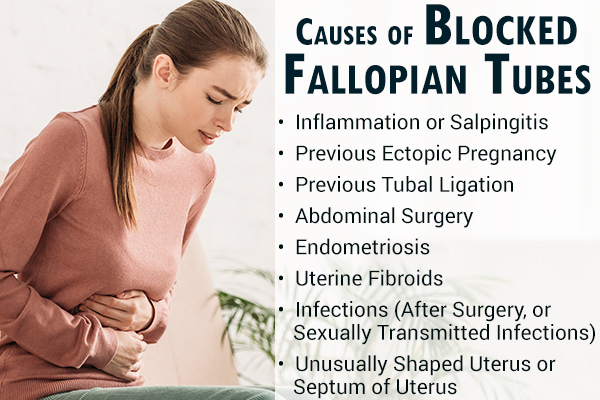In this article:
The fallopian tubes are ducts in the female reproductive system that are attached to both sides of the uterus. Any blockage in the tubes can prevent fertilization of the egg with the sperm.

Fallopian tube obstruction accounts for 25%–30% of all infertility cases. It includes complete blockage of both fallopian tubes, blockage in one fallopian tube, and scarring or narrowing of the tubes. This blockage may be improved with surgery or IVF.
Importance of the Fallopian Tubes in Fertilization
Because fertilization takes place inside the fallopian tubes, any damage, blockage, or deformity in the tubes can prevent the interaction of the egg and sperm, resulting in infertility.
In some cases, the fallopian tube blockage may allow entry of the sperm, but it might be too small for the passage of the embryo into the uterus, leading to an ectopic pregnancy.
In such a case, the embryo may attach anywhere outside the uterus. The result can be bleeding into the abdomen. Ectopic pregnancy is a medical emergency that can be treated with medication or surgery. (1)
Causes of Blocked Fallopian Tubes

An obstruction in the tube can occur in various locations, including:
- Proximal end – near the uterus
- Distal end – toward the ovary
- Entire tube in severe cases
The following reasons may cause blockage or scarring of the fallopian tubes, leading to infertility:
- Inflammation or salpingitis
- Previous ectopic pregnancy
- Previous tubal ligation
- Abdominal surgery (such as a cesarean section)
- Endometriosis
- Uterine fibroids
- Infections such as pelvic inflammatory disease (PID), sexually transmitted infections such as chlamydia and gonorrhea, and tuberculosis
- Unusually shaped uterus or septum of the uterus
Moreover, fallopian tube obstruction can also be a result of liquid accumulation from a hydrosalpinx or pyosalpinx instead of physical scarring.
Symptoms of Blocked Fallopian Tubes
Generally, blocked fallopian tubes do not produce any symptoms. The condition often goes undiagnosed until the patient experiences reproductive problems, including:
- Failure to conceive after trying for a year (6 months for women above 35)
- Constant pelvic pain that worsens around the time of menstruation and during sexual intercourse (may be due to endometriosis)
- Ectopic pregnancy
However, these signs are not always indicative of obstructed fallopian tubes and should be checked by a medical practitioner for proper diagnosis.
Treatment Options
The treatment for blocked fallopian tubes chiefly depends on its cause.

If infertility problems are occurring even if one of the tubes is open, treatment includes:
- Fertility drugs: These drugs enhance the chances of conceiving.
- Surgery: Laparoscopic or open surgery can be performed to remove any anatomic cause, release scar tissues, or remove endometriosis. The surgery also may involve the removal of fibroid tumors if they are blocking the uterine end of the tubes.
When both the tubes are blocked, available treatment options include:
- In vitro fertilization (IVF): It is an assisted reproduction procedure and does not involve unblocking of the tubes.
- Surgery: The tubes are unblocked with surgery, which involves cutting out the blocked part of the tube and rejoining the ends. This surgery is usually done using laparoscopic procedures or microsurgery techniques. The different types of surgeries performed are tubal reanastomosis, salpingectomy, and fimbrioplasty.
If hydrosalpinx is diagnosed and pelvic inflammatory disease (PID) is suspected, patients can be treated with antibiotics. (2)
The physician may also recommend surgical treatment if:
- A pregnancy is suspected.
- A tubo-ovarian abscess is detected, which is found in almost 15% of all such cases.
- The patient is non-compliant or cannot tolerate oral therapy.
- Symptoms are severe and include nausea, vomiting, and high fever.
- Uncertain diagnosis and surgical emergencies cannot be ruled out (e.g., appendicitis).
Moreover, it is important to remember that surgical procedures can lead to complications such as:
- Bleeding
- Infection
- Scar tissue
- Organ damage
- Ectopic pregnancy
Therefore, a patient should select the mode of treatment most suitable to their condition after discussing all options with their doctor at length.
Which Medical Intervention Is Better – IVF or Surgery?
Surgical procedures act on the root cause of infertility and enable you to get pregnant without fertility treatments. It is also cheaper than IVF cycles.
IVF, on the other hand, does not treat the reason for infertility. However, IVF may help you get pregnant faster than surgery, and the success rate of IVF is more than that of pregnancy after tubal surgery.
Diagnosing Fallopian Tube Blockage

Standard diagnostic procedures for blocked fallopian tubes include:
- Study of medical history
- Hysterosalpingogram (HSG)
- Imaging tests, which may include ultrasound and/or hysteroscopy
- Laparoscopic surgery
Complications
The most common complications associated with fallopian tube obstruction or scarring include:
- Ectopic pregnancy
- Infertility/inability to give birth
- Psychological stress caused by the inability to conceive
When to See a Doctor
It is recommended to seek medical help if you have not been able to conceive despite regular sexual intercourse, three times a week, without birth control for over a year.
Women above 35 years should seek medical consultation after 6 months of trying to conceive. Any fertility evaluation will include a checkup of your fallopian tubes.
Expert Answers (Q&A)
Answered by Dr. Mario A. Congiu, MD (Obstetrics and Gynecology)
Yes, a woman can still ovulate if she has a blockage in her tube(s). However, the obstruction in the passage of the oocyte might cause ectopic pregnancy or infertility.
Yes, women with a blocked fallopian tube can still menstruate.
Yes, a miscarriage can cause a blockage in the fallopian tube.
Final Word
A blockage in the fallopian tube can commonly cause infertility by inhibiting either the movement of the sperm or the fertilized egg.
You must consult your doctor about the different treatment options for infertility resulting from blocked fallopian tubes and determine whether or not you need surgery.

- Was this article helpful?
- YES, THANKS!NOT REALLY



